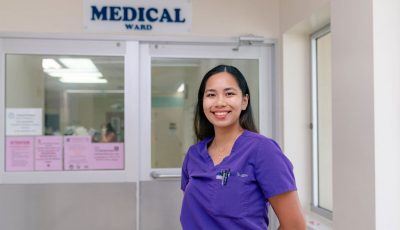Adjusted nurses’ salaries seen as a means to keep them
The Commonwealth Healthcare Corp. is increasing the salaries of nurses to help the islands’ lone hospital not only to retain its current nursing staff but to attract U.S.-eligible nurses as well.
CHCC CEO Esther Muña said under the proposal, the salary for bachelor of science in nursing graduates will start at $42,000 a year, an associate degree in nursing with no experience begins at $37,000 annually, and a National Council Licensure Examination passer will start at $37,000 yearly.
“The salary increase is one of the contingency plans that will benefit our workers and ultimately, our community hospital. We were planning on this anyway, but we didn’t know we have to do it right now,” she said.
Muña is looking at internal resources and identifying available opportunities.
“We are considering hiring retired nurses. We have been working with [Rep.] Jose Itibus to talk about the issue of retired nurses. There is a plan to meet with the health committees of the House and the Senate. We want to be able to bring back the retired nurses who are willing and able to go back and practice their profession.”
Muña even has a copy of the names of the retired nurses they are eyeing.
“We have names of those retired nurses for the last five years. We are going to contact them and we want to make sure they would like, can work, and legally [double] dip,” Muña said.
There is a double dipping law that allows retired nurses to work for a limited period of two years after retirement. It allows the retiree to work at another or less tedious position such as outpatient work or engage in part-time work.
“To be able to give them the opportunity to be able to work beyond the two years under the circumstances is a good thing. We have been maximizing a lot of the nurses whenever they leave. We actually pay them, so that is when they ‘double dip.’
“This is precisely the reason why we want to ask [Rep.] Itibus if we can allow these nurses to be able to come back. So if that’s possible, that is something we want to work on with Rep. Itibus to basically remove the restriction and change the system so we can have the retired nurses back,” Muña said.
CHCC is looking into giving the nurses EB-2 visas that allows those in certain specialized professions—such as doctors, business managers, and educators—who have a master’s degree or higher to gain lawful permanent residence in the U.S.
“It’s going to cost us money and we are going to ask the CNMI government to help us with appropriation funds for this. We are in the business of healthcare and we have to invest on the people in order to treat people. We are estimating half a million dollars just to process. If we need to hire a lawyer or for people to do the processing for us, fine. We want to get it done as soon as possible.”
“We also want to make sure that nurses are qualified for EB-2, where the processing [time] is from six months to one year. If they do not qualify for EB 2, then maybe we there are some people eligible for H1-B. We will determine which is the best for them. Both statuses are a pathway to getting a green card,” Muña said.
Getting the EB 2 visa and H1-B visa comes with responsibilities and commitment.
“There will definitely be changes in the employment contract. We are going to talk to a lawyer from the AG’s [Attorney General’s] Office or legal counsel to come out with an agreement that if we are going to process the green card that there is some commitment to CHCC as the employer. The longer you work for CHCC, the easier to pay it back. We are proceeding with this so we wont have any more problem.”
The traveling nurses from the U.S. are scheduled to arrive in the CNMI within a week. “We are going to make adjustments in the shift of work. We are working with the medical staff for acceptable moves in shifts and operations,” Muña added
CHCC is losing 14 nurses due to their CW-1 visa expiration this month and there are expecting more CW-1 visa holders that will go through the same process this year. For its part, CHCC has been continuously working out plans and adding contingencies to prevent similar situations so as not to disrupt hospital operations.
Muña said, “We certainly don’t want this to happen to us again next year. We hope to have this issue a non-issue next year. We hope to have all of our nurses and all workers in the hospital intact.”



























